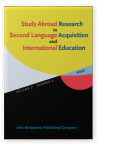Vol. 7:2 (2022) ► pp.204–239
Vol. 7:2 (2022) ► pp.204–239
Changes in second-language learners’ oral skills and socio-affective profile following short-term study abroad to Japan
Thirty-seven second language (L2) learners of Japanese (21 L1 English, 16 L1 Chinese) participated in an eight-week study abroad (SA) program to Japan. Pre- and post-SA oral proficiency interviews were used for ACTFL-level assessments and ratings of component skills (pronunciation, fluency, grammatical accuracy, vocabulary/content, interaction skills). Surveys measured socio-affective variables and L2 engagement (using a modified Language Contact Profile). Thirty-six participants increased in ACTFL level. Both L1 groups showed a significant increase in component skills and perceived competence. For L1 Chinese participants, pre-SA perceived competence significantly correlated with time spent in brief exchanges using Japanese. For L1 English participants, gains in interaction scores remained significant after controlling for the significant increase in positive communication affect. Thematic analysis of participants’ journals revealed the homestay environment was the nexus of activities supporting communication skill development through exchanges of viewpoints and culture learning, frequently over dinner. Homestays also contributed to developing greater L2 speaking confidence.
Article outline
- 1.Introduction
- 2.Literature review
- 2.1L2 contact and proficiency gains
- 2.2Measurement of oral proficiency gains
- 2.3Learners’ socio-affective profiles
- 2.4Insights from qualitative inquiry
- 2.5Present study
- 3.Method
- 3.1SA setting
- 3.2Participants
- 3.3Materials
- 3.4Procedure
- 3.4.1Surveys
- 3.4.2Oral proficiency interview
- 3.5Analysis of speech samples
- 3.5.1ACTFL assessment
- 3.5.2Component skill rating
- 4.Results and discussion
- 4.1L1 American English
- 4.1.1Socio-affective profile and L2 engagement surveys
- 4.1.2Oral proficiency
- 4.1.3Summary of rater comments
- 4.1.4Relationships among the data
- 4.1.5Participant journals
- 4.2L1 Chinese
- 4.2.1Socio-affective profile and L2 engagement surveys
- 4.2.2Oral proficiency
- 4.2.3Summary of rater comments
- 4.2.4Relationships among the data
- 4.2.5Participant journals
- 4.1L1 American English
- 5.General discussion
- 6.Conclusion and further research
- Notes
-
References
